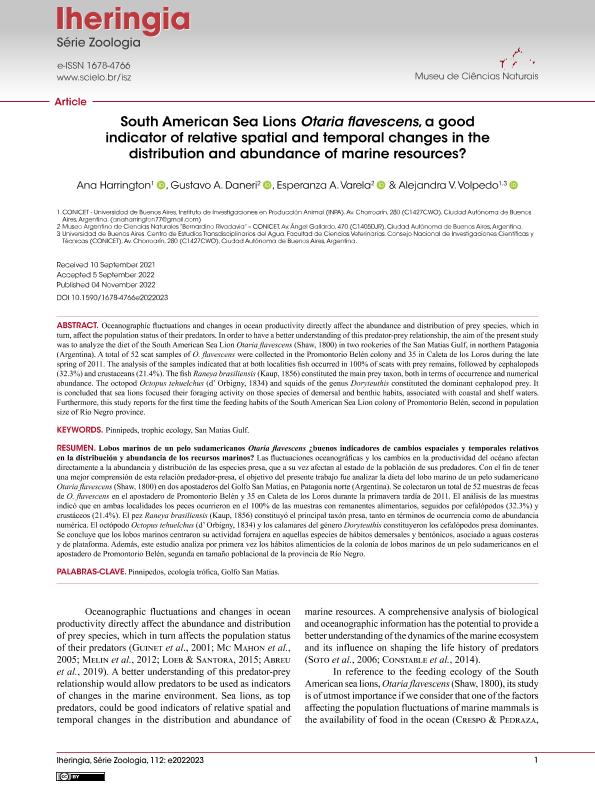Artículo
South American Sea Lions Otaria flavescens, a good indicator of relative spatial and temporal changes in the distribution and abundance of marine resources?
Título:
Lobos marinos de un pelo sudamericanos Otaria flavescens ¿buenos indicadores de cambios espaciales y temporales relativos en la distribución y abundancia de los recursos marinos?
Fecha de publicación:
04/11/2022
Editorial:
Fundaçao Zoobotanica Rio Grande Sul
Revista:
Iheringia. Série Zoologia
ISSN:
1678-4766
Idioma:
Español
Tipo de recurso:
Artículo publicado
Clasificación temática:
Resumen
Oceanographic fluctuations and changes in ocean productivity directly affect the abundance and distribution of prey species, which in turn, affect the population status of their predators. In order to have a better understanding of this predator-prey relationship, the aim of the present study was to analyze the diet of the South American Sea Lion Otaria flavescens (Shaw, 1800) in two rookeries of the San Matias Gulf, in northern Patagonia (Argentina). A total of 52 scat samples of O. flavescens were collected in the Promontorio Belén colony and 35 in Caleta de los Loros during the late spring of 2011. The analysis of the samples indicated that at both localities fish occurred in 100% of scats with prey remains, followed by cephalopods (32.3%) and crustaceans (21.4%). The fish Raneya brasiliensis (Kaup, 1856) constituted the main prey taxon, both in terms of occurrence and numerical abundance. The octopod Octopus tehuelchus (d’ Orbigny, 1834) and squids of the genus Doryteuthis constituted the dominant cephalopod prey. It is concluded that sea lions focused their foraging activity on those species of demersal and benthic habits, associated with coastal and shelf waters. Furthermore, this study reports for the first time the feeding habits of the South American Sea Lion colony of Promontorio Belén, second in population size of Río Negro province.
Palabras clave:
PINNIPEDS
,
SAN MATIAS GULF
,
TROPHIC ECOLOGY
Archivos asociados
Licencia
Identificadores
Colecciones
Articulos(INPA)
Articulos de UNIDAD EJECUTORA DE INVESTIGACIONES EN PRODUCCION ANIMAL
Articulos de UNIDAD EJECUTORA DE INVESTIGACIONES EN PRODUCCION ANIMAL
Articulos(MACNBR)
Articulos de MUSEO ARG.DE CS.NAT "BERNARDINO RIVADAVIA"
Articulos de MUSEO ARG.DE CS.NAT "BERNARDINO RIVADAVIA"
Citación
Harrington, Ana; Daneri, Gustavo Adolfo; Varela, Esperanza Amalia; Volpedo, Alejandra; South American Sea Lions Otaria flavescens, a good indicator of relative spatial and temporal changes in the distribution and abundance of marine resources?; Fundaçao Zoobotanica Rio Grande Sul; Iheringia. Série Zoologia; 112; 4-11-2022; 1-8
Compartir
Altmétricas




